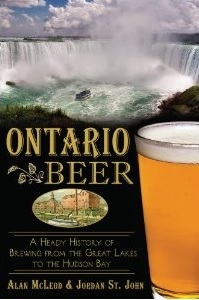 OK, so far the Ontario provincial election appears to be playing out as an effort to ensure the same outcome as last time. As a result, even though it is an excellent time to discuss beer buying policy in the province, no one is doing so… yet. Fervent please by bloggers, newspaper columnists, commercial interests which were winding the story up just a few weeks ago have also gone quite quiet. Odd. Can’t be the interim blackout on political advertising. It was not always so. If we consult the book we see that in 1924, when Ontario was fed up with the strictest form of dry law under provincial law beer sales became a widely fought public issue:
OK, so far the Ontario provincial election appears to be playing out as an effort to ensure the same outcome as last time. As a result, even though it is an excellent time to discuss beer buying policy in the province, no one is doing so… yet. Fervent please by bloggers, newspaper columnists, commercial interests which were winding the story up just a few weeks ago have also gone quite quiet. Odd. Can’t be the interim blackout on political advertising. It was not always so. If we consult the book we see that in 1924, when Ontario was fed up with the strictest form of dry law under provincial law beer sales became a widely fought public issue:
Support for temperance was weakening based on the public awareness of the failure of the law and corruption it brought. In October of 1924, when another plebiscite on temperance was held, the vote against repeal had fallen to only 51.5%. Major population centres like Toronto, Ottawa, Hamilton and Windsor all voted against keeping the law. In response, Premier Ferguson raised the strength of permitted light beer to 4.4 proof from 2.5 and also redistributed the seats in the legislature to remove wet seats and add dry ones. Reaction to the new beer was not rabid as one newspaper noted:
To the imbibers who thought that they were going to get some kick out of the potation, the ordination was as disappointing as a cancelled marriage license to an old maid. Many of them claimed, in fact, that the new beverage bore such a family likeness to the old 2 percent that it might be its twin brother. Unlike the stuff that made Milwaukee famous, there was no blinds staggers accumulated from the new suds. Temperance people who thought the wolf was here in sheep’s clothing will have to wait a while.
Not surprisingly, Ferguson won re-election in December, 1926 on the platform of repeal of the temperance law and replacement with a system of government controlled liquor sales.
So, beer retailing can become a winning story even if it does not seem to be doing so now. Either one of two things is happening. Folk are not as motivated in 2014 to pursue the political route to effect beer retailing change as they were ninety years ago in 1924… or politicians have not had the interests of the public effectively brought to their attention as a vote getter. I suspect it is the first possibility as there has been plenty in the news. It’s just that the story has not been made compelling enough yet to actual inspire real action, to move people to switch habits at the ballot box.
The strangest thing, however, is how like Premier Ferguson in the early 1920’s any of the three main political parties could themselves use it to justify getting votes if they just framed it as an illustration of their core values. Sure, the Tories under Tim Hudak have supported corner store sales but only tepidly so despite it being a tale of small business and personal freedoms. Beer as the drink of the working class sure could be again framed as a boon to the left, the union made drink of the little guy and the NDP – but so far the party is only “open to new ideas.” The Grits under Premier Wynne have sided with the no vote so deeply that it might be tough to now shift, preferring to take the “we control stuff so you don’t have to” route. Gridlock.
What is needed is a compelling new angle for one of these parties to latch on to as a way to present itself as mirroring a compelling positive public need back to the public. What is it and who gets to it first?

L. Brooks – May 17, 2014 3:40 PM
It appears your wish is an dead issue. Apparently, Hudak has come out and said that making changes to the LCBO or how alcohol is distributed in the province is a non-issue. Since the PCs were the only party that actually talked about it, it appears that this is going to be a non-issue election-wise.
Alan – May 17, 2014 3:58 PM
Most interesting is how the brewers, including craft brewers, have stopped speaking out. Could it be that they are not interested in being seen as taking sides?